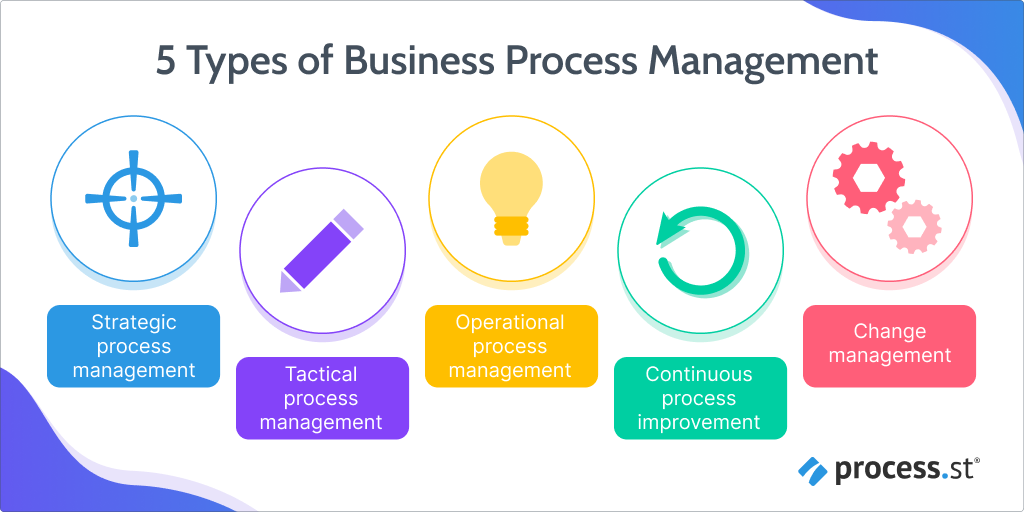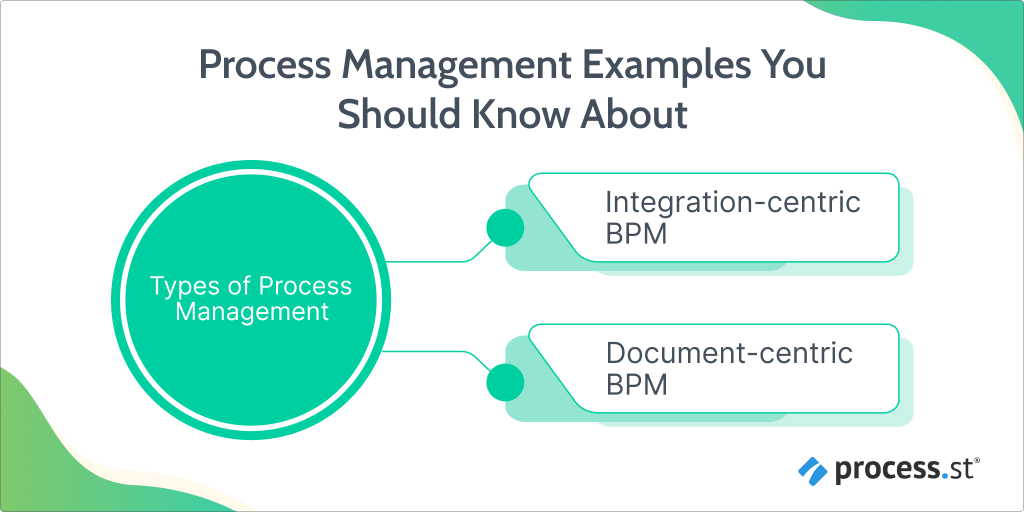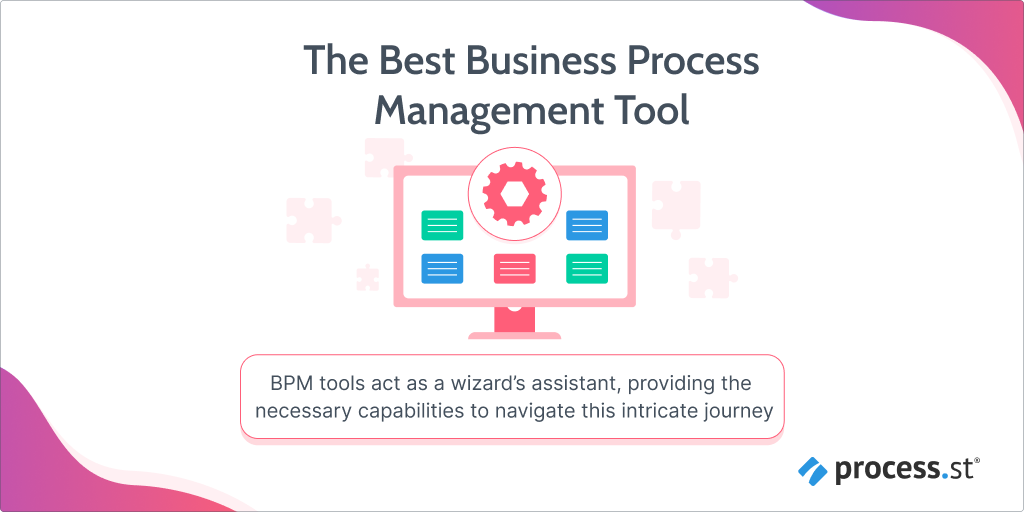5 Types of Process Management: Better Business Operations (Examples + Benefits)
Process management plays a vital role in the business world.
It drives efficiency and operational effectiveness. Embracing process management is the key to unlocking the true potential of any business endeavor.
In this blog post, we will embark on a journey filled with valuable insights, practical examples, and the secrets to unlocking operational excellence.
Get ready to discover the wonders of BPM, a powerful approach that brings efficiency, productivity, and success to organizations of all sizes.
Picture this: a bustling business landscape where processes run like well-oiled machines, teams collaborate seamlessly, and customers are delighted at every turn.
Welcome to the world of business process management!
With BPM by your side, you can streamline operations, eliminate inefficiencies, and achieve remarkable outcomes.
This blog post will shine a light on how you can embraced BPM to achieved remarkable success.
What is process management?
Process, or operations management, encompasses a diverse range of responsibilities and strategies to enhance efficiency and productivity within an organization. Let’s explore the types of process management, its role, and its importance in various industries.
One essential component of operations management is business process mapping. It involves visually representing the steps involved in a particular process, enabling organizations to identify areas for improvement and streamline their operations.
Operations management plays a crucial role in ensuring the smooth functioning of an organization by overseeing production processes, managing resources, and optimizing performance. It is the backbone of businesses, keeping operations running seamlessly and efficiently.
In the manufacturing industry, operations management ensures that production lines are optimized, resources are allocated effectively, and quality control measures are in place. In the service sector, it is pivotal in managing customer interactions, improving service delivery, and maintaining customer satisfaction.
The operations management process involves various stages, from planning and organizing to implementing and controlling. It requires a keen eye for detail, strong analytical skills, and effective communication to ensure smooth operations and achieve organizational goals.
5 types of process management

When it comes to operations management, understanding the different types of process management is like uncovering the secret spells that make businesses thrive.
So, grab your wizard hat and let’s explore these processes!
Strategic process management
Imagine a grand master plan guiding the actions of an organization. That’s strategic process management!
It involves setting long-term goals, developing strategies, and aligning resources to achieve them. It ensures everyone is on the same page and working towards a common objective.
Tactical process management
The nitty-gritty of day-to-day operations. Tactical process management focuses on executing the plans devised in the strategic phase.
It affects resource allocation, task assignment, and monitoring progress. It’s like being the conductor of an orchestra, making sure each instrument plays its part harmoniously.
Operational process management
This type of process management brings the strategies and tactics to life on the operational frontlines.
Operational process management is about implementing and controlling processes to achieve desired outcomes and keep the organizational machine running smoothly.
Continuous process improvement
The magic doesn’t stop once the processes are up and running. Continuous process improvement is all about fine-tuning and enhancing operations over time.
For example:
- Analyzing performance,
- Identifying bottlenecks
- Implementing changes to optimize efficiency.
Change management
This is the art of navigating organizational transitions. It ensures that process changes are smoothly integrated into the existing operations.
It involves communication, training, and addressing resistance to change. It’s like casting a spell that transforms the status quo into something even more extraordinary.
By understanding these different types of process management, you can wield your magic wands and achieve operational excellence.
Each type plays a crucial role in orchestrating the various aspects of operations and keeping the gears turning.
The role of process management in the business world
Process management takes center stage in the dynamic realm of business processes, playing a crucial role in driving efficiency and productivity.
It acts as a guiding force, streamlining operations and ensuring smooth workflows.
Let’s take a peek into process management and explore its significance in the business landscape.
BPM
At the core of process management lies the practice of business process management (BPM).
BPM involves:
- Analyzing
- Designing
- Implementing
- Continuously improving business processes
It serves as a blueprint, paving the way for seamless and effective operations.
BPM can be tricky to master, so many organizations rely on tools like business process management software to facilitate this journey.
These software solutions automate, monitor, and optimize processes, enhancing efficiency and minimizing errors. They serve as invaluable companions, supporting businesses in their pursuit of operational excellence.
A good example of this is Process Street.
With Process Street, you can create and manage process documentation, workflows, and checklists in a centralized location. It acts as a virtual assistant, guiding teams through each step of a process, ensuring consistency and accuracy.
One of the most remarkable features of Process Street is its ability to automate workflows.
By leveraging its automation capabilities, you can eliminate manual tasks, reduce errors, and improve overall efficiency.
It’s like having a reliable digital assistant that takes care of all the repetitive and time-consuming activities!
And if you’d like to deepen your understanding of BPM, there’s a wealth of knowledge to be found in business process management PDF, such as The Complete Guide To Business Process Management. This amazing resource provides all you need to know, including valuable insights, and best practices.
Benefits of process management
Process management is a secret weapon that empowers organizations to achieve operational excellence and drive success.
By implementing effective process management strategies, you’ll unlock a myriad of benefits.
Let’s explore the rewards that await those who embrace process management.
Improved efficiency
Processes are the lifeblood of any successful business.
Through process management, you will identify bottlenecks, eliminate redundancies, and streamline workflows.
This leads to increased productivity, faster turnaround times, and optimized resource allocation.
Enhanced quality
Process management emphasizes consistency and standardization, ensuring that tasks are performed in a uniform and reliable way.
By enforcing quality control measures and monitoring key performance indicators, you’ll deliver products and services of superior quality, resulting in higher customer satisfaction.
Cost reduction
In the world of business, cost reduction is highly prized. Process management will enable you to identify areas of waste and inefficiency, allowing you to make informed decisions on resource allocation.
All this will hep you achieve significant cost savings.
Increased agility
Adaptability is key in today’s business landscape. Effective process management ensures you can respond swiftly to changing market conditions, customer demands, and industry trends.
This allows a culture of continuous improvement and flexibility, so you can stay ahead of the competition and seize new opportunities.
Organizational alignment
Process management facilitates cross-functional collaboration and alignment within an organization.
Clearly defining roles, responsibilities, and workflows ensures that everyone understands their contribution to the larger picture.
This alignment then fosters teamwork, communication, and a shared sense of purpose.
Examples of business process management

BPM is not just a theoretical concept; it’s a powerful tool that has revolutionized how organizations operate.
To better understand its impact, let’s dive into some real-life examples of BPM in action.
One common example of BPM is integration-centric BPM. This approach focuses on connecting various systems and applications within an organization, allowing for seamless data exchange and collaboration. Imagine a company using BPM to integrate its customer relationship management (CRM) system with its inventory management system. This integration enables real-time inventory updates, streamlined order processing, and improved customer service.
Another type of BPM is document-centric BPM, which focuses on managing and automating document-based processes. For example, a company may need to implement BPM to streamline their invoice processing. By digitizing and automating the invoice approval workflow, they eliminate manual errors, reduce processing time, and gain better control over their financial operations.
In another example, a global manufacturing company may implement document-centric BPM to streamline their product development process. The BPM system enables efficient team collaboration, automates document approvals and version control, and provides real-time visibility into the development lifecycle. This accelerates time-to-market, ensures compliance with regulatory requirements, and drives innovation.
These examples highlight the versatility and impact of BPM in real-life scenarios.
From integration-centric BPM connecting systems to document-centric BPM automating document workflows, you can leverage BPM to optimize processes, drive efficiency, and achieve strategic objectives.
The best business process management tool

In the realm of business process management, there’s a secret ingredient that adds a touch of magic to the mix: BPM tools.
These powerful tools are like wands in the hands of skilled sorcerers, empowering organizations to optimize their processes and achieve operational excellence.
Let’s explore the wonders of BPM tools and their role in driving efficiency and productivity.
At its core, BPM is the art of analyzing, designing, implementing, and improving business processes. BPM tools act as a wizard’s assistant, providing the necessary capabilities to navigate this intricate journey. One such remarkable tool is Process Street.
Process Street is a game-changing BPM tool that takes process management to new heights.
With its intuitive interface and robust features, Process Street lets you create, automate, and optimize processes with ease. It’s like having a trusty companion that guides you through every step of your BPM journey.
One of the key features of Process Street is its support for document-centric workflows.
In a document-centric BPM approach, the focus is on managing and automating document-based processes. Process Street allows you to create customizable checklists and workflows, ensuring that documents flow seamlessly through each stage. It’s like casting a spell that eliminates manual errors, streamlines approvals, and enhances collaboration.
But BPM is not just about documents; it’s also about the people who make the magic happen.
Human-centric BPM recognizes the importance of individuals in the process ecosystem. Process Street understands this and provides features that promote collaboration, accountability, and transparency among team members.
With Process Street, you can effortlessly capture and digitize your processes, automate repetitive tasks, and track progress in real-time. It’s like having a spellbook filled with powerful incantations that streamline your operations and unleash the full potential of your organization.
Will you embrace the magic of BMP?
So, whether you’re strategizing, executing tactics with precision, or continuously improving your processes, it’s time to embrace process management.
It’s a world where the right processes can turn ordinary businesses into extraordinary ones.
In the ever-evolving business landscape, BPM tools like Process Street have become essential for organizations seeking to stay ahead of the curve. They empower businesses to adapt, optimize, and thrive in the face of challenges and opportunities.
Let Process Street be your trusted partner as you embark on your journey toward operational excellence and enchanted success.







 Workflows
Workflows Projects
Projects Data Sets
Data Sets Forms
Forms Pages
Pages Automations
Automations Analytics
Analytics Apps
Apps Integrations
Integrations
 Property management
Property management
 Human resources
Human resources
 Customer management
Customer management
 Information technology
Information technology


